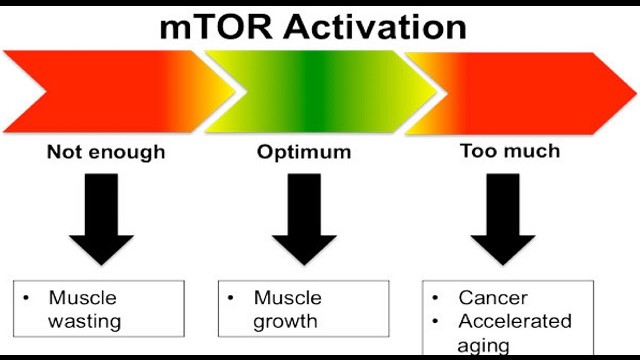mTOR Activation Bodybuilding

Before we discuss the specifics of what mTOR is all about, we need to first explain a formula that has been accepted by sports science. The experts explain to us that our Net Protein Breakdown we have in our body is basically all our skeletal muscle mass that we carry on our frame. So the first aspect we need to understand NPB is your Net Protein Breakdown. Whenever your NPB is positive you're gaining muscle.
Below we will explain what the sports science communities' formula for effective and sustainable muscle growth is: NPB (Net Protein Breakdown) = MPS (Muscle Protein Synthesis) - MPB (Muscle Protein Breakdown). We will explain this formula/equation again at the end of the article below:
When you train hard at gym you're breaking muscle, however if you eat correctly this broken/damaged muscle is able to repair itself. This muscle turnover is very high in a trained athlete and anyone who trains on a regular basis. Sports science explains to us that between 1% and 2.4% of all our lean muscle mass gets broken down and rebuilt every day.
The good food you eat has many potent activators to help muscle protein synthesis; however these nutrient-induced increases will be relatively short-lived. When you train or workout, this will ramp up your muscle protein synthesis (MPS) dramatically for about 24 hours.
When you're not eating correctly the protein degradation decreases you're (MPB) which obviously can negate any protein synthesis potential, while repairing from the workout. The catch 22 in all of this is that without any workout to stimulate protein synthesis, your normal muscle protein breakdown will cancel any protein synthesis that might happen from eating a high-protein diet.
Muscle growth is about increasing muscle protein synthesis (MPS) because of what you do in the gym for an hour a day, giving your body the required nutrients it needs, when it needs it and suppressing muscle degradation will build muscle on a sustainable basis. All of this has got to do with the boss in charge of priming your muscles to increase MPS is called your mTOR.
Sports science told us years ago that when we lift a heavy weight on a regular basis the body's primary response is muscle protein synthesis (MPS). It's this important protein synthesis activation that gets controlled by a rather complicated string of phosphorylation events organized by the most important protein in the muscle building process called Rapamycin, or mTOR.
mTOR is the master-controller for all muscle protein synthesis (MPS) in your cells, the more any workout is able to activate your mTOR, the more protein synthesis your proteins for the damaged muscle your machinery is able to crank out. Your mTOR is activated by 3 things:
Mechanical stress (Lifting or training with heavy loads)
Growth factors (Insulin response, IGF, HGH, other growth hormones, etc.)
Amino acids (leucine)
The "Anabolic Window"
This "Anabolic Window" is where you'll be able to increase your protein synthesis response to your training by eating correctly. Sports science has been studying this for years and they've now discovered there are 3 times during a normal training day where you can exploit this anabolic window to maximal effect, increasing your protein/amino-acid availability radically.
Pre-workout snack/smoothie: Within an hour before workout starts.
While you're training your ATP is used to fuel your muscle contractions, this increases your AMP levels, activating this AMP increase releases an AMP kinase protein (AMPK) that actually reduces protein synthesis because it inhibits mTOR. Sports science tells us that a pre-workout snack, juice or supplementation will slightly inhibit AMP levels.
Peri-workout juice/smoothie: During your training session.
Researchers tell us that extensive research shows that although having any peri-workout nutrition shows similar benefits to the pre-workout studies mentioned above, the best mTOR stimulation to increase protein synthesis came from the post workout nutrition studies.
The post-workout nutrition works because it will increase your insulin response, which is a very powerful protein degradation inhibitor and therefore will blunt the AMPK response = less muscle degradation.
The post-workout: Max 90 minutes after workout
Your post-workout meal is able to "amp-up" your protein synthesis after you've had a hard workout. All your muscle cells are now primed for maximum protein synthesis in the few hours after training, but you got to get the right nutrition in. Building muscle needs protein, sports science now tells us that timing your protein intake correctly increases protein synthesis by boosting your mTOR.
It's important to note here that the maximal muscle protein synthesis (MPS) activation that you managed to achieve on a short-term basis will ultimately determine exactly how well you respond in the long term. This means that intense workouts are required to maximally activate your muscle protein synthesis (MPS), but also the correct nutrition needs to be given at the right time, if it's to be sustainable.
This "anabolic window" is open for a short time in your 24 hour day, you would be doing your efforts at building muscle a big favor by noting the importance of taking in protein during this critical 2 hour anabolic window. Sports nutritionist's tell us that essential amino acids (EAAs) will activate protein synthesis, along with leucine being somehow able to turn on all your protein synthesis machinery.
In conclusion, the formula mentioned at the beginning of the article was NPB (Net Protein Breakdown) = MPS (Muscle Protein Synthesis) - MPB (Muscle Protein Breakdown). Hopefully we are all a little bit wiser on how to increase the effectiveness of your nutrition to build muscle.
Click Here for Free Anabolic Insider Magazine Subscription
Disclaimer: The information presented is intended to be used for educational purposes only. The statements made have not been evaluated by the Food and Drug Administration (U.S.). These products are not intended to diagnose, treat, cure or prevent any condition or disease. Please consult with your own physician or health care practitioner regarding any suggestions and recommendations made.
 Anabolics Mall
Anabolics Mall